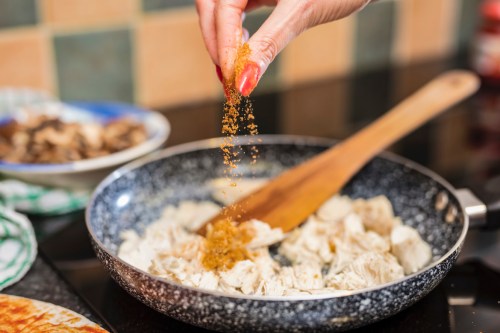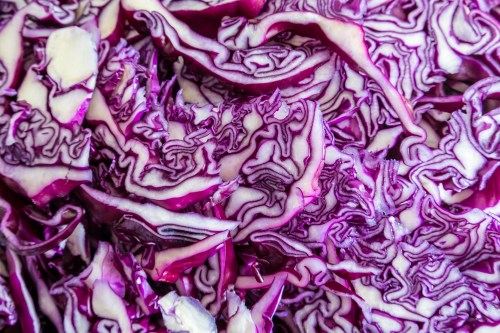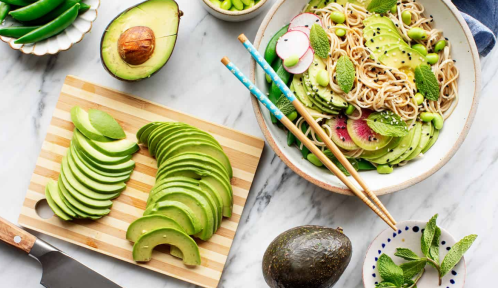Our editors independently select these products. Making a purchase through our links may earn Well+Good a commission
Even beginner cooks know that spices are the not-so-secret weapon to making even the simplest dishes of rice or scrambled taste amazing. “Not only do they give great flavor but also many of them are packed with antioxidants and anti-inflammatory benefits,” says Maggie Michalczyk, RD. It’s a reason why experimenting with spices is a key part of this year’s plant-based ReNew Year challenge.
Experts in This Article
registered dietitian and recipe developer
registered dietitian nutritionist, recipe developer, and author based in Atlanta, Georgia.
But if you’re been using the same five or six flavors for most of your pandemic cooking needs (will it ever end), you’re likely getting a little bored with your food—which is where these five RD-approved spice substitutions come into play. Think of them as one-to-one swaps of your go-tos that can be used interchangeably while giving your taste buds something new to enjoy.
If you use paprika, try… smoked paprika
If you’re looking to [TikTok voice] add a little spice to this staple ingredient, choose smoked paprika. It works interchangeably with regular paprika, but adds a subtle, warm, smoky flavor that elevates every dish.
“Thanks to its red color, paprika contains carotenoids (specifically beta carotene), a family of antioxidants with powerful health benefits,” says Michalczyk. “One tablespoon of paprika contains 100 percent of the recommended daily intake of vitamin A, which is great for night vision and immune function.”
Use it any place you want to infuse a smoky BBQ flavor without getting out the grill. It’s excellent for chili, chicken wings, or salmon for your next big game night! (It also makes a great finishing touch on deviled eggs.)
Shop now: The Spice House Smoked Spanish Hot Paprika, $9
If you use garlic salt, try… garlic powder
Garlic salt is delicious, there’s no denying that. But as the name implies, it contains added salt, which if consumed in excess can lead to water retention, excess thirst, and poor cardiovascular health. “It’s important to be mindful of how much salt we consume as overtime high sodium can lead to high blood pressure which is a risk factor for heart disease and more,” says Michalczyk. (It’s not just a garlic salt thing; in general, she says to avoid spice mixes that have added sugar or salt.)
Instead, amp up the garlicky flavor in your meals with garlic powder, which is more concentrated than the fresh allium. “Garlic contains natural antibiotic and as well as anti-inflammatory properties that help protect against diseases,” Michalczyk adds.
Shop now: Jackie’s Kitchen Garlic Powder, $5
If you use mustard powder, try… turmeric
You’re at this point hopefully already using turmeric in lots of dishes, but did you know that it’s a surprisingly effective substitute for mustard powder in a pinch? Neither did I. “Turmeric is a must-have in your spice drawer thanks to its antioxidant and anti-inflammatory benefits, both of which help to support a healthy immune system,” says Michalczyk. You can reap the benefits in a wide variety of dishes by sprinkling it into soups, marinades and salad dressing, hummus, and more.
“Be sure wherever you add turmeric you also add black pepper too! Black pepper enhances our bodies absorption of turmeric—making them a spice power couple,” she adds.
Shop now: Diaspora Co. Pragati Turmeric, $12
If you use cinnamon, try… cardamom
Another clever spice substitution you might not have considered: using cardamom in place of cinnamon. “Like cinnamon, cardamom is a warm and aromatic spice that offers a slight sweetness,” says culinary and integrative dietitian Marisa Moore, RDN. Cardamom is native to southern India and can be used in a variety of ways. (It also has antioxidant effects.) “Add it to warm drinks such as chai, desserts, or to curries combined with other spices,” she suggests.
Shop now: Burlap and Barrel Cloud Forest Cardamom, $10
If you use cayenne, try… berbere
Berbere is an Ethiopian spice blend that provides complex heat—a great complement to (or substitution for) cayenne pepper. “The traditional blend combines chile peppers, fenugreek, garlic, and warming spices such as ginger, allspice and cardamom,” says Moore. “This spice can be used to season lentils and different stews or even sprinkled on fruit,” she says. Try sprinkling it on mango for a sweet and spicy treat.
Shop now: Spicewalla Berbere, $9
Oh hi! You look like someone who loves free workouts, discounts for cult-fave wellness brands, and exclusive Well+Good content. Sign up for Well+, our online community of wellness insiders, and unlock your rewards instantly.
Sign Up for Our Daily Newsletter
Get all the latest in wellness, trends, food, fitness, beauty, and more delivered right to your inbox.
Got it, you've been added to our email list.











